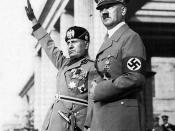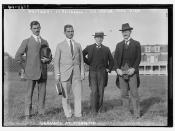"Historians have traditionally dismissed the practioners of the policy of appeasement, especially British Prime Minister Neville Chamberlain, as "guily men" - guilty for failing in their duty to keep their countries secure and safe from war." By examining the events and actions of the British and her allies in the years preceding World War II, it can be argued that while perhaps Chamberlain's judgement call to give in to Hitler on many occasions, could be justified morally, it was a policy that endangered his country and ultimately led it into war. "However deplorable wars may be .... there are times when justice, when faith, when the welfare of mankind, require a man not to shrink from the responsibility of undertaking them."
By 1938, the world once again feared the horrors of a global war. Germany had grown from a morally and economically broken nation , into a strong state trying to regain her position in Europe.
Under the terms of the Treaty of Versailles, Germany was crippled and unable to compete as a power in the world. However, tricky diplomatic manouvering by Hitler combined with the allies policy of appeasement, led to the resurgence of a Greater Germany. The final, and most spoke of act of appeasement was the signing of the Munich pact, concluded at the Four Power Munich Conference of Sept 29-30, 1938. This conference featured Prime Ministers of Britain and France, Neville Chamberlain and Edouard Daladier, and the dictators, Hitler of Nazi Germany, and Mussolini of Facist Italy. The immediate result was the dismemberment of Czechoslovakia and this represented the high point of the policy of appeasement.
Giving in to the German demands did not begin with the demolition of the Czechoslovakian state. Men before Chamberlain could have stepped forward and stopped the growth of Nazi...


